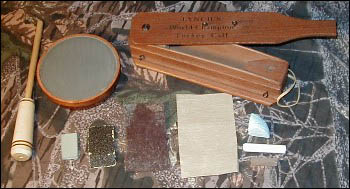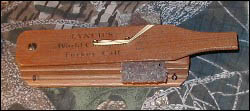|
How
to Maintain Your Turkey Calls
-- by Rob Ramsdale
--
Just like your hunting
vehicle, shotgun, and other hunting equipment, turkey
calls also need maintenance to keep them sounding
great throughout the season and to help them last
many years. Most types of turkey calls including mouth
calls, box calls, and friction calls need some Tender-Loving-Care
to keep them sounding good. Here are a few tips to
help you keep all your calls in tip-top shape.
Box
Calls
 |
|
Some of the
materials you will need
|
The reason most box
calls begin sounding like screeching gates is a lack
of friction between the lid/paddle and the sides/rails
of the box. When you buy a box call, there is almost
always a small piece of chalk included and maybe some
instructions to chalk the lid once in awhile. What
they fail to mention is often the problem isn't lack
of chalk but maybe some oil off of your hands has
gotten on the call, the call has gotten wet or the
call has been used so much it has burnished (made
smooth) the surface of the lid.
The first step in maintaining
your box call is to really clean the bottom of the
lid of the call and the tops of the sides/rails of
the call. I recommend starting to do this with a simple
Scotch-Brite type of kitchen scouring pad. These pads
have a lot of abrasiveness and generally this will
be all you will need to get the surfaces clean. Occasionally,
you may have to try something that's a little more
abrasive to get the lid roughed up enough to hold
chalk again. Get some 220 or 240 grit sandpaper and
lightly sand the surface. Never sand really hard or
with coarser grit sandpaper because you don't want
to change the curvature of the paddle and definitely
not the sides of the call. They were made that way
for a reason and if you sand them down, the call will
never sound right again. When you are sanding the
bottom of the lid, it is fine to sand across
the grain of the wood on the lid/paddle. The extra
scratches in the wood actually helps the paddle hold
the chalk and will improve the friction between the
paddle and the sides of the box.
 |
|
Use your
cleaning pad as a lid silencer
when you are hunting.
|
After the surfaces are
clean, it's now time to reapply the chalk. Put a very
light layer of chalk on the call's lid (Don't chalk
the top of the sides at all, they need to remain bare
wood to get the most friction.) Many box call gurus
will use a thin layer of rosin on the paddle instead
of chalk and this does make a lot of sense. The rosin
provides friction just like the chalk, lasts longer,
and also gives the added benefit of waterproofing
the lid a little bit. Also, if you think about it,
a box call is not unlike other musical instruments
like a violin or cello which also use a rosined-up
bow to get their sound. If you have a pine tree available,
you can make your own rosin by melting down the hard
chunks of pine pitch found on the bark of the tree
and screening out all of the extra dirt, insects and
pieces of bark.
When you are buying
chalk just remember to never use regular blackboard
chalk or any other chalk that has added wax in it.
You want to get pure chalk. Most carpenter's chalks
or welder's chalks work fine along with the readily
available brown box call chalk sold by various
manufacturers. It is better to avoid the blue, white
and red chalks if possible since those are the colors
associated with a gobbler's head.
The one thing to always
keep in mind when using or storing your box call is
to keep it free from moisture. Nothing ruins a call's
sound quicker than a warped bottom or side. If you
get your box damp, let it dry naturally at room temperature.
I often use the tip I picked up from reading a Neil
Cost book and dry them on top of my computer monitor.
(He used to dry the calls he was working on by letting
them set on top of his TV since it gives a nice, even,
heat. My computer monitor is on more often so I use
it instead.)
I often see or hear
of people playing around with the screw that holds
the lid on. My caution here is don't do this unless
your call is absolutely atrocious sounding. All box
calls have been tuned by the call maker when you buy
them. It is possible I guess for a box to get out
of tune but generally it has more to do with not keeping
the paddle properly chalked. Just use caution and
mark the position of the screw before you try retuning
it so you can always return it to its initial setting.
Slate
/ Friction Calls
These types of calls probably take
the most maintenance to keep them sounding good. Slate
calls in particular are very susceptible to moisture
and oils from your hands and if the surface gets slick,
it will sound absolutely horrible or you will get
no sound at all. Just remember your goal is to have
as much friction as possible between the tip of your
striker and surface of the glass or slate call you
are using. I always carry several Scotch-Brite type
pads with me when I'm hunting in case I lose one since
these calls need touching up all of the time.
The same rules apply here as in box
calls. Start out with just a Scotch-Brite type pad
for both the natural slate calls and the other composite
surface or glass calls. If necessary you can use some
very fine sandpaper (220 or 240 grit) but usually
the scouring pad will work fine. And also, don't forget
the tip of the striker. It too will get very slick,
especially when using a glass/crystal type call, and
needs to be sanded occasionally. I usually check my
slate-type calls and strikers each time I make a set-up
when I'm hunting and I'll clean them several times
a day.
The glass, crystal and ceramic calls
can be very difficult to deal with since most of them
do not come pre-conditioned when you buy them new.
If your new call comes and looks as slick as, well,
glass then you will have to condition it before you
can expect to get any sounds out of it. To condition
a new glass call, you must use either the special
conditioning stones that are available or some fairly
coarse grit emery cloth or sandpaper which is also
usually provided. Glass/crystal calls are very hard
and it takes a lot of elbow grease to get the surface
of the call properly conditioned. Make sure and sand
the call in one direction only when you initially
condition a call. After you are done you can then
play the call by pulling the striker across those
ridges.
Once the glass call gets conditioned
with the stone or emery cloth once, I usually never
use those again on the surface since they remove a
lot of material and you'll wear down your call in
a hurry. Instead I rely simply on the Scotch-Brite
type pads to keep them clean and roughed-up. Grease
and dirt do more harm to glass calls than anything
and scouring pads will remove them very well.
Mouth
/ Tube Calls
Both diaphragm/mouth calls and tube
calls use latex reeds to get their sounds. The two
biggest enemies of latex are 1) Sunlight and 2) Heat.
Therefore, anything you can do to keep your calls
cool and in the dark will help increase their lifespan.
One of the best things you can do is store them in
a cool, dark place, such as your refrigerator or freezer
during the off-season. If you use the freezer, make
sure and seal them in an airtight freezer bag first
to keep out moisture. It doesn't seem to be as necessary
if you store them in the refrigerator. Many
people also soak their mouth calls in mouthwash during
the season to keep them clean. I admit, I don't do
this although I probably should. Instead, I do rinse
them off with water fairly often.
Most box type turkey calls are built
to last a lifetime and they should with a little care.
The natural slate and glass/composite calls will wear
down over a long period of time because you do removed
material each time you sand them. You probably won't
wear them through but you will notice the sound changing.
Mouth calls definitely have a short lifespan and if
you can get several years from one that's doing pretty
good. Just remember to put a little effort in maintaining
your calls and I'm sure they'll repay you many times
over.
|

